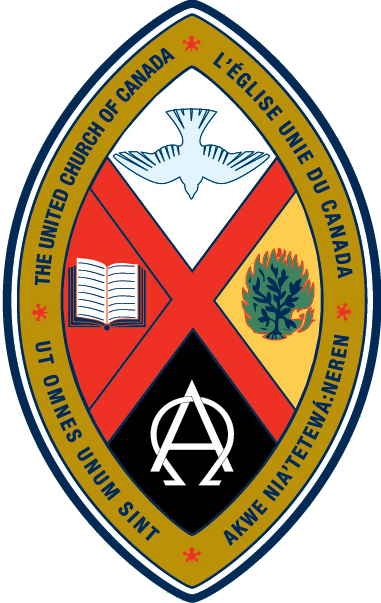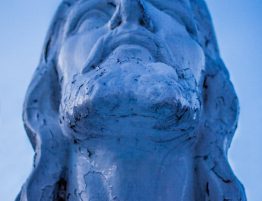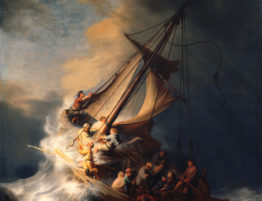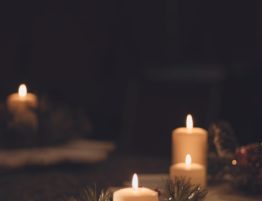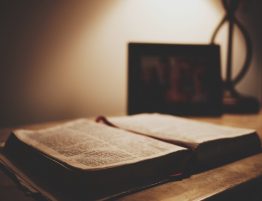
Music as We Prepare to Worship – Sam Hirst
The Lighting of the Christ Candle
Invitation to Worship
We have gathered this morning to worship God – known to us as Kind Creator, Compassionate Friend, Ever-Present Spirit.
We have gathered seeking comfort, inspiration, community, and insight.
We have gathered to open ourselves to God’s presence among us, and by that presence to be enabled and empowered to love the world in Jesus’ name.
Opening Prayer
Gracious and Loving God, fit us for this new day. Through your Spirit, grant us wisdom and courage, so that whatever today holds, we may recognize opportunities, and not be overwhelmed by difficulties. Through Christ Jesus, fill us with you love, so that differences may not divide us, through your creative energy, make us new, so that the past may not enslave us. Creator, Christ and Spirit lead us into newness of life. Amen.
Opening Hymn “Praise My Soul the God of Heaven” (VU#240 vs.1-3)
- Praise my soul, the God of heaven, glad of heart your carols raise; ransomed, healed, restored, forgiven, who, like me, should sing God’s praise. Hallelujah! Hallelujah! Praise the Maker all your days!
- Praise God for the grace and favour shown our forebears in distress; God is still the same forever, slow to chide and swift to bless. Hallelujah! Hallelujah! Sing our Maker’s faithfulness.
- Like a loving parent caring, God knows well our feeble frame; gladly all our burdens bearing, still to countless years the same. Hallelujah! Hallelujah! All within me, praise God’s name!
Bible Reading: Exodus 1.8 – 2.10
The Book of Exodus is the second book in the Torah of Judaism, and the second book in our Bible. It is sometimes called the Second Book of Moses. It contains the ancient story of the Hebrew people’s escape from slavery in Egypt – through the leadership of Moses. Most Biblical scholars agree that the stories were written down in the Sixth Century. This was at the time when Jerusalem was sacked and Solomon’s Temple laid waste by the Babylonians Empire. The Rabbi’s wisely recognized that the stories needed to be written down so that the people, living in exile from their “Promised Land” – would be able to understand their identity as God’s chosen people.
This morning we read the story of Moses birth and rescue from Pharaoh’s tyranny. As we hear these words, listen for the word of God.
1.8 Now there arose a new king over Egypt, who did not know Joseph. 9 And he said to him people, “Behold, the people of Israel are too many and too mighty for us. 10 Come, let us deal shrewdly with them, lest they multiply, and if war befall us, they join our enemies and fight against us and escape from the land.” 11 Therefore they set task masters over them to afflict them with heavy burdens; and they built for Pharaoh store-cities, Pithom and Raamsees. 12 But the more the Hebrew people were oppressed, the more they multiplied and the more they spread abroad. And the Egyptians were in dread of the Israel. 13 So they made the people of Israel serve with rigor, 14 and made their lives bitter with hard service, in mortar and brick, and in all kinds of work in the field; in all their work the Egyptians made the people of Israel serve with rigor. 15 Then the king of Egypt said to the Hebrew midwives, one of whom was named Shiphrah and the other Puah, 16 “When you serve as midwife to the Hebrew women, and see them upon the birth stool, if it is a son you shall kill him; but if it is a daughter, she shall live.” 17 But the midwives were devout and committed to the care of the women and newborns, and they did not do as the king of Egypt commanded them, but let the male children live. 18 So the king of Egypt called the midwives and said to them, “Why have you done this, and let the male children live?” 19 The midwives replied to Pharaoh, “Because the Hebrew women are not like the Egyptian women; for they are vigorous and they are delivered before the midwife comes to them,” 20 So God dealt well with the midwives; and the people multiplied and grew very strong. 21 And because the midwives were devout, wise and compassionate, God gave them families. 22 Then Pharaoh commanded all his people, “Every son that is born to the Hebrews you shall cast into the Nile, but you shall let every daughter live.
2.1 Now a man from the tribe of Levi went and took a wife a daughter of Levi. 2 The woman conceived and bore a son; and when she saw that he was healthy and strong, she hid him for three months. 3 And when she could hide him no longer, she took for him a basket made of bulrushes, and daubed it with bitumen and pitch; and she put the child in the basket-boat and placed it in the water, among the reeds at the river’s bank. 4 And his sister stood at a distance, to know what would happen to him. 5 Now the daughter of Pharaoh came down to bathe at the river, and her maidens walked beside the river. The princess saw the basket among the reeds and sent her servant to fetch it. 6 When she opened it, she saw the child; and lo, the babe was crying. She took pity on him and said, “This is one of the Hebrew children.” 7 Then the baby’s sister said to Pharaoh’s daughter, “Shall I go and call a nurse from the Hebrew women to nurse the child for you?” 8 And Pharaoh’s daughter said to her, “Go.” So, the girl went and called the baby’s mother. 9 And Pharaoh’s daughter said to her, “Take this child away, and nurse him for me, and I will give you your wages.” So, the baby’s mother took him and nursed him. 10 And the child grew, and she brought him to Pharaoh’s daughter, and he became her son; and she named him Moses, for she said, “Because I drew him out of the water.”
Prayer: May the words of my mouth and the meditations of all our hearts be acceptable in your sight, O God, our Rock and our Redeemer. Amen.
“Wise & Courageous: They Made a Difference”
It was early days. Early in the developing story of the Hebrew people. These were the descendants of Jacob – the grandson of Abraham. You’ll recall, from the Book of Genesis, the story of Jacob who was given a new name – Israel – after wrestling all night with and angel.
And we remember Joseph – one of Jacob’s younger sons. Yes, that’s right, the guy with the fancy coat which tradition has it was multi-coloured and had long sleeves. Joseph was attacked by his jealous brothers and after being stripped of his famous coat – he was tossed in a pit – only to then be dragged out and sold to distant cousins – the Ishmaelites – and taken as a slave to Egypt.
Joseph found favour in the Kingdom on the Nile. It turned out that the Pharaoh had a disturbing dream. Joseph knew about dreams. Through his interpretation he was given charge of famine preparation, with the full authority of the King.
But at the beginning of our story today, we are told that a new King came to the throne – one who did not know Joseph.
In the few verses we read this morning we learn that the People of Israel were thriving. They were becoming numerous enough that Pharaoh took notice.
At first, he enslaved the people and had them working to construct two new cities. He also made use of their abilities in agriculture – putting them to work in the fields. But still the people grew in numbers so Pharaoh decided on desperate measures.
Enter two devout Hebrew midwives – Shiphrah and Poah.
These two were called in for a tete a tete with the King. He gave them clear instructions. All he needed them to do was to murder every baby boy born to the Hebrew women. The women did not argue with the King. But they went away and continued to serve the women and newborn babies of their people with distinction. Boys and girls were safe with Shiphrah and Poah attending their births.
The King called them to the palace because it was clear that his plan wasn’t working. These two women were “on the carpet”. Their lives were on the line. Pharaoh would have had to get out of bed before Breakfast if he was to outsmart these folk – they were both wise and courageous. When the King demanded to know why they hadn’t carried out his instructions – they put the blame on the strength and vigor of the Hebrew mothers, who were not like the Egyptian women of Pharaoh’s acquaintance. No, these enslaved women gave birth before the Midwife arrived. (As a footnote to the story, the author of Exodus tells us that God rewarded the Midwives with families because of their wisdom & courage.)
But Pharaoh wasn’t satisfied to take “no” for an answer. He enlisted all of Egypt in his murderous scheme. Every baby boy born to the Egyptians was to be thrown into the crocodile infested waters of the Nile.
This is where the story gets very interesting. We go from hearing of the general difficulties experienced by these enslaved people – to a specific family story.
The author does not identify the parents by name – although he tells us they were of the tribe of Levi. (Later on, we find that the man was Amram, and the woman was Jochebed.) These two were married and had a baby boy. His mother, we are told, hid him for three months. I imagine that she had some help in covering up his presence in the household – a three-month-old baby boy can certainly make his needs clear with a healthy set of lungs!
The mother came up with an ingenious plan. She took a basket and made it into a boat! Setting the child, no doubt sleeping at the time, in the basket/boat she set him in the reeds at the edge of the river.
An important part of the plan was for his older sister Miriam to stay close-by and watch to see what would happen. This was the place where the Princess of Egypt came to bathe in the river.
The Princess saw this unusual object and sent one of her maids to fetch it. Opening the basket, she discovered a healthy crying baby boy.
The Princess was intrigued – and recognized that this was one of the Hebrew children.
That’s when Miriam stepped in to offer to find a woman who could nurse the baby until he was weaned. The Princess went along with the plan and Miriam ran to her mother – bringing her back to meet the Princess. (I can’t imagine that Jochebed was very far away!) The Princess instructs the mother to keep the baby, and when he is weaned, to bring him to the Palace – where he will be raised as her son. She named him Moses – because she had taken him out of the water.
We know that Moses is the hero of this story – from the rest of the Book of Exodus. Moses grew up in Pharaoh’s household. He was later to become the great liberating leader of his own Hebrew people – leading them to freedom and to the Promised Land.
But where would Moses have been without the wisdom and courage of these five women.
Shiphrah and Poah – midwives who dared to defy the orders of the King – and whose creativity spun a yarn about the strength and vigor of their Hebrew patients, who delivered their babies without assistance. Their wisdom and their courage made a difference.
Then we have the mother, Jochebed, – who came up with the plan to place her growing baby in a basket/boat and place him in the river. (I’m sure it wasn’t by accident that the site for launching of the baby was where the Princess bathed.)
And his big-sister, Miriam, stayed close-by to see what would happen. The plan worked! The Princess rescued the baby. But that is not all – the baby still needed a wet-nurse. Miriam ran and brought his mother who was equipped for the job!
Aside from being a great way to introduce the story of Moses – setting the stage for his future leadership – this is a story of how five women/ five persons made a difference in the life of one baby boy who became a great leader.
No doubt Moses’ inheritance included the wisdom & courage displayed by the midwives, by his Mom, his sister and the Princess.
Sometimes we wonder, especially we who are part of small congregations, whether we can really make a difference for good in the world.
Here in the first and second chapters of Exodus, we are given a story – and an assurance – that even though we are few – we can make a difference for good.
There are many other examples of individuals and small communities, in the Bible, who, though they were few; and though they were at times overwhelmed by difficulties, made great contributions to their parts of the story.
Jesus, choosing twelve men to be part of his inner circle – and just a few dozen more that were also among his disciples – women and men.
So, yes, we can make a difference! We can let our voices be heard in calling for justice and peace in our world. We can add our voices to “Black Lives Matter”. We can let our voices be heard in addressing the climate crisis.
Every day we have opportunities to make a difference.
So – “Go Make a Difference!” knowing that God continues to call and equip us – as individuals and as members of our little congregations – for the mission and ministry of loving the world – the whole creation – in Jesus’ name.
Amen.
Acknowledgement of Gifts, Tithes & Offerings
Prayer of Gratitude and Concern
The Lord’s Prayer
Parting Hymn “Go Make a Diff’rence” (MV #209)
Refrain: Go make a diff’rence. We can make a diff’rence. Go make a diff’rence in the world. Go make a diff’rence. We can make a diff’rence. Go make a diff’rence in the world.
- We are the salt of the earth, called to let the people see the love of God for you and me. WE are the light of the world, not to be hidden but to be seen. Go make a diff’rence in the world.
Refrain:
- We are the hands of Christ reaching out to those in need, the face of God for all to see. We are the spirit of hope; we are the voice of peace. Go make a diff’rence in the world.
Refrain:
- So, let you love shine on, let is shine for all to see. Go make a diff’rence in the world. And the Spirt of Christ will be with us as we go. Go make a diff’rence in the world.
Commissioning & Blessing
Extinguishing the Christ Candle
Music as We Move into the World

